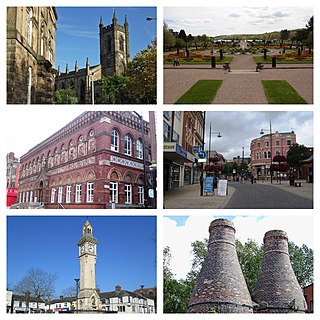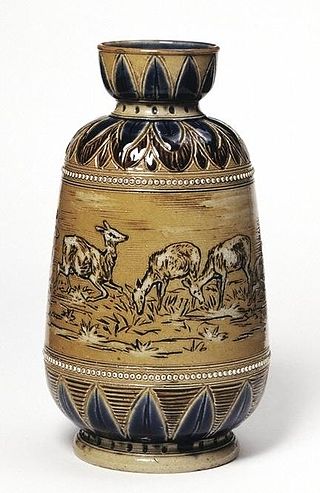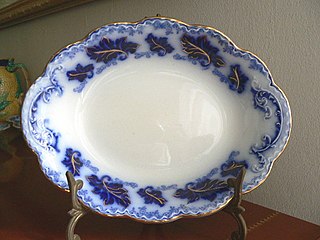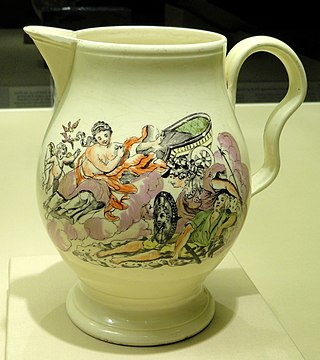
Staffordshire is a landlocked ceremonial county in the West Midlands region of England. It borders Cheshire to the northwest, Derbyshire and Leicestershire to the east, Warwickshire to the southeast, the West Midlands and Worcestershire to the south, and Shropshire to the west. The largest settlement is the city of Stoke-on-Trent, and the county town is Stafford.

Stoke-upon-Trent, also called Stoke, is one of the six towns that along with Hanley, Burslem, Fenton, Longton and Tunstall form the city of Stoke-on-Trent, in Staffordshire, England.

Stoke-on-Trent is a city and unitary authority area in Staffordshire, England, with an area of 36 square miles (93 km2). In 2019, the city had an estimated population of 256,375. It is the largest settlement in Staffordshire and is surrounded by the towns of Newcastle-under-Lyme, Alsager, Kidsgrove and Biddulph, which form a conurbation around the city.

Spode is an English brand of pottery and homewares produced by the company of the same name, which is based in Stoke-on-Trent, England. Spode was founded by Josiah Spode (1733–1797) in 1770, and was responsible for perfecting two extremely important techniques that were crucial to the worldwide success of the English pottery industry in the century to follow.

The Staffordshire Potteries is the industrial area encompassing the six towns Burslem, Fenton, Hanley, Longton, Stoke and Tunstall, which is now the city of Stoke-on-Trent in Staffordshire, England. North Staffordshire became a centre of ceramic production in the early 17th century, due to the local availability of clay, salt, lead and coal.

Burslem is one of the six towns that along with Hanley, Tunstall, Fenton, Longton and Stoke-upon-Trent form part of the city of Stoke-on-Trent in Staffordshire, England. It is often referred to as the "mother town" of Stoke on Trent.

Barlaston is a village and civil parish in the borough of Stafford in the county of Staffordshire, England. It is roughly halfway between the city of Stoke-on-Trent and the small town of Stone. According to the 2001 census the population of the parish was 2,659, rising at the 2011 Census to 2,858.

Wedgwood is an English fine china, porcelain and luxury accessories manufacturer that was founded on 1 May 1759 by the potter and entrepreneur Josiah Wedgwood and was first incorporated in 1895 as Josiah Wedgwood and Sons Ltd. It was rapidly successful and was soon one of the largest manufacturers of Staffordshire pottery, "a firm that has done more to spread the knowledge and enhance the reputation of British ceramic art than any other manufacturer", exporting across Europe as far as Russia, and to the Americas. It was especially successful at producing fine earthenware and stoneware that were accepted as equivalent in quality to porcelain but were considerably cheaper.
Portmeirion is a British pottery company based in Stoke-on-Trent, England. They specialise in earthenware tableware.

Royal Doulton is an English ceramic and home accessories manufacturer that was founded in 1815. Operating originally in Vauxhall, London, and later moving to Lambeth, in 1882 it opened a factory in Burslem, Stoke-on-Trent, in the centre of English pottery. From the start, the backbone of the business was a wide range of utilitarian wares, mostly stonewares, including storage jars, tankards and the like, and later extending to drain pipes, lavatories, water filters, electrical porcelain and other technical ceramics. From 1853 to 1901, its wares were marked Doulton & Co., then from 1901, when a royal warrant was given, Royal Doulton.

Johnson Brothers was a British tableware manufacturer and exporter that was noted for its early introduction of "semi-porcelain" tableware. It was among the most successful Staffordshire potteries which produced tableware, much of it exported to the United States, from the 1890s through to the 1960s. They were also important manufacturers of large bathroom ceramics. Some of its designs, such as "Eternal Beau", "Dawn", "Old Britain Castles" and "Historic America", achieved widespread popularity and are still collected today. The company's success was due in part to its ability to identify and follow trends that appealed to its customers in the United States, and in part to the high quality of its designs, produced by skilled artists.

Churchill China PLC is a British pottery manufacturer based in Stoke-on-Trent in the United Kingdom.

Mintons was a major company in Staffordshire pottery, "Europe's leading ceramic factory during the Victorian era", an independent business from 1793 to 1968. It was a leader in ceramic design, working in a number of different ceramic bodies, decorative techniques, and "a glorious pot-pourri of styles - Rococo shapes with Oriental motifs, Classical shapes with Medieval designs and Art Nouveau borders were among the many wonderful concoctions". As well as pottery vessels and sculptures, the firm was a leading manufacturer of tiles and other architectural ceramics, producing work for both the Houses of Parliament and United States Capitol.
Twyford Bathrooms is a manufacturer of bathroom fixtures based in Alsager, Cheshire, England.

The Gladstone Pottery Museum is a working museum of a medium-sized coal-fired pottery, typical of those once common in the North Staffordshire area of England from the time of the industrial revolution in the 18th century to the mid 20th century. It is a grade II* listed building.
Shelton is an area of the city of Stoke-on-Trent in Staffordshire, England, between Hanley and Stoke-upon-Trent.

Emma Bridgewater is a British ceramics manufacturing company founded in 1985. The company specialises in earthenware tableware, manufactured in Stoke-on-Trent, England. The pottery is produced using traditional techniques. The company is one of the largest pottery manufacturers based entirely in the UK.

Aynsley China Ltd. was a British manufacturer of bone china tableware, giftware and commemorative items.

William Greatbatch was a noted potter at Fenton, Staffordshire, from the mid-eighteenth to the beginning of the nineteenth centuries. Fenton was one of the six towns of the Staffordshire Potteries, which were joined in the early 20th century to become the city of Stoke-on-Trent in Staffordshire, England.
Ian James Dudson is an English industrialist, chief executive and later non-executive chairman of the ceramics company Dudson in Stoke-on-Trent. He has served as Lord Lieutenant of Staffordshire since 2012.


















